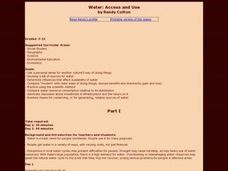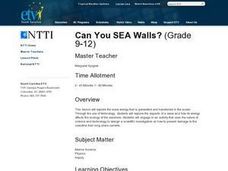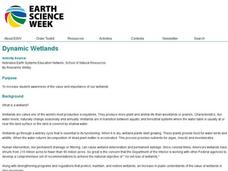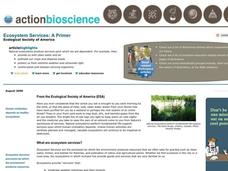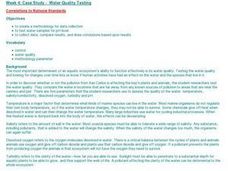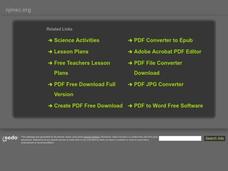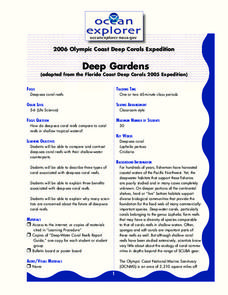Curated OER
Biological Sciences
Young scholars examine biodiversity and interrelatedness concepts. In this ecology lesson students go on a field trip and fill out a data sheet.
Curated OER
The Other Water Cycle
Learners examine human impacts on the water cycle. They compare/contrast the permeability of various materials for the purpose of engineering landscape drainage systems, and answer discussion questions.
Curated OER
Water: Access and Use
Students get a personal sense for another culture's way of doing things. Develop a list of sources for water. Practice using the scientific method. Examine means for conserving, or for generating, reliable sources of water.
Curated OER
Can You SEA Walls?
High schoolers explore how wave energy that is generated and transferred in the ocean. They explore the aspects of a wave and how its energy affects the ecology of the seashore. Students engage in an activity that uses the nature of...
Curated OER
Rice Farming in Texas
Third graders explore how rice farming came to Texas. In this rice farming lesson, 3rd graders discover the history of how farmers began to grow rice in the United States. Students color code maps and create a timeline for rice farming...
Curated OER
Dynamic Wetlands
High schoolers construct and observe a model of two different types of wetlands. In this wetlands lesson, students create a model of a wetland with constant drainage and a wetland that maintains a well-saturated soil. High schoolers...
Curated OER
Central Park Field Trip
Students visit the park to observe signs of spring in the forest and pond environments. In this field trip lesson, students explore the park for various items
Curated OER
Coral Reef Conservation
High schoolers conduct discussions on current threats to coral reefs around the world and write letters to conservation organizations urging support for coral reef protection.
Curated OER
Wetlands/Migration
Students use a hopscotch course to simulate the problems birds incur as they are migrating due to loss of wetlands.
Curated OER
How Much Is an Ecosystem Worth?
Students examine the value of ecosystems. They read and analyze an article, evaluate ecosystem services, research the benefits of biomonitors, and design a public service announcement.
Curated OER
The Greening of Mars: The Changes Necessary to Sustain Life on Mars
Fifth graders discuss the currents conditions on the planet of Mars. In groups, they work together to develop a mechanism that allows for a balanced ecosystem to survive on the planet. After presenting their ideas to the class, they...
Curated OER
Water Quality Testing
Student explore factors affecting ecosystems. They test local water samples for pH level. After creating a methodology for data collection, they collect data, compare results, and draw conclusions based upon results.
Curated OER
Long Island Sound - A Research Skill Approach
Eighth graders examine the characteristic of Long Island Sound. In groups, they use the internet to describe how the Sound formed and what environmental changes have altered it. They also discover what humans have done to affect the...
Curated OER
Recognizing How Another Culture Differs From One's Own
Students identify and understand the significant cultural traits described by the author. They discover how the concepts of time and punctuality can differ markedly in the United States and another country and determine that In some...
Curated OER
Classification and Identification
Students, after exploring and analyzing diagrammatic and taxonomic keys and their association to marine sciences, identify and classify objects and organisms based on visual attributes/characteristics. They research and create their own...
Curated OER
Landforms and Resources of the United States and Canada
In this North American geography worksheet, students read about the physical features and resources of the United States and Canada. Students take notes and answer 3 short answer comprehension questions as they read the selection.
Curated OER
The Changing Earth
Students observe and analyze weathering. In this earth science lesson plan, students demonstrate physical and chemical weathering in two experiments, then write questions for a class Jeopardy game.
Curated OER
Mangrove Loss Faster than Land-Based Forests
Students explore the reasons Mangrove forests are in jeopardy. In this lesson, students read an article that discusses specific facts on Mangrove forests, then complete numerous activities that reinforce the information, such as...
Curated OER
Deep Gardens
Students investigate the differences and similarities between shallow-water and deep-sea coral reefs. In this coral reef lesson, students research and compare the characteristics of reefs. Students describe various lifeforms...
Curated OER
Treasures in Jeopardy
Learners study how coral reefs can be protected from humans and their activities. In this conservation lesson students explain the benefits of coral reefs and what humans can do to help protect them.
Curated OER
What is the Rocky shoreline?
Second graders access prior knowledge of the rocky shoreline. In this rocky shoreline lesson, 2nd graders create questions about the rocky shoreline. Students define vocabulary related to the rocky shoreline. Students...
Curated OER
A Green Patina Finish
Students create a blue-green patina that serves as a protective coating on copper jewelry or other artwork. Using four different experimental methods, students apply patina to copper pieces and compare the results of the different...
Curated OER
Hurricanes in History:
Students interpret data displayed in a graph, make inferences based on graphical data. They work in pairs or groups to interpret graphs containing historical data of hurricanes, and then answer questions that assess their understanding...
Curated OER
Regions of the US: Gulf Stream, States and Their Capitals
Fifth graders identify one way of dividing the US into geographical regions and then consider alternate ways of doing the same. They locate each of the fifty states and their capitals on a map. They research the Gulf Stream region.


